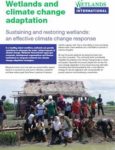This 6-page brochure demonstrates how wetlands in a healthy, intact condition can greatly contribute to attenuate the water related impacts of climate change. Due to their ability to store and slowly release water, these wetlands are a vital lifeline in periods of extreme droughtsWetlands International urges governments, development organisations and finance institutions to integrate wetlands into climate change adaptation strategies.

Wetlands and Climate Change Adaptation Brochure
TéléchargerDescription
Mangrove forests and coral reefs are natural buffers against impacts of sea level rise and storms. Marshes, peatlands and lakes reduce peak flood flows in periods of extreme rainfall or glacier melt. Due to their ability to store and slowly release water, these wetlands are a vital lifeline in periods of extreme droughts.
Magnifying the problem
All over the world, wetlands are being lost faster than any other ecosystem. This continuing trend considerably magnifies the problems that climate change brings to nature and people. Especially the poorest people that are also the most strongly dependent on the natural resources will suffer.
Cost-effective strategy
Sustaining and restoring wetlands form a cost-effective strategy for climate adaptation with strong benefits for
poverty reduction and biodiversity conservation.